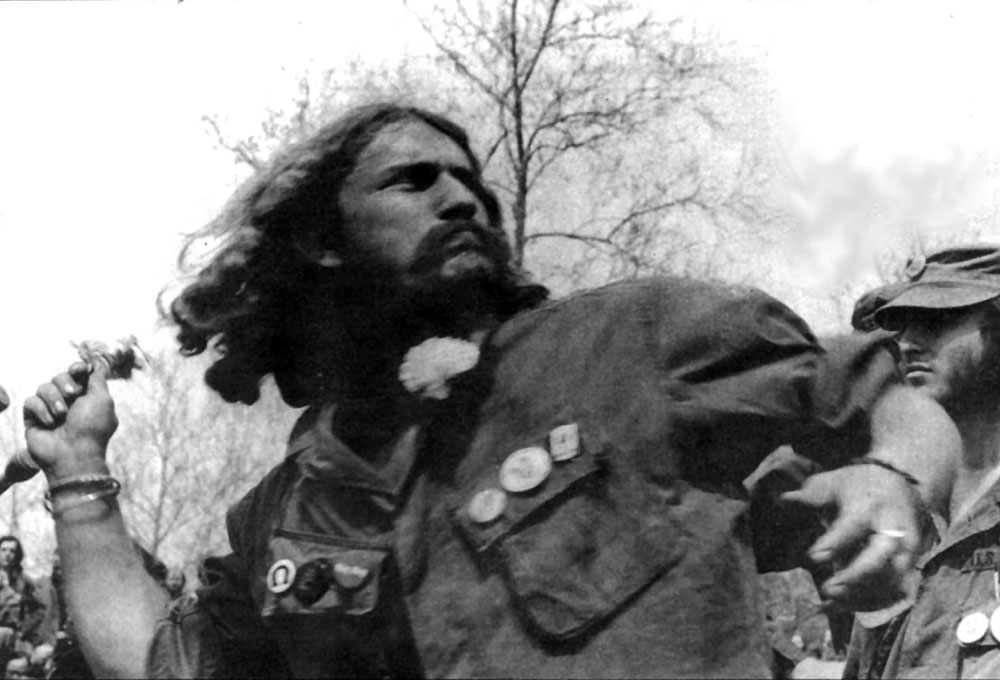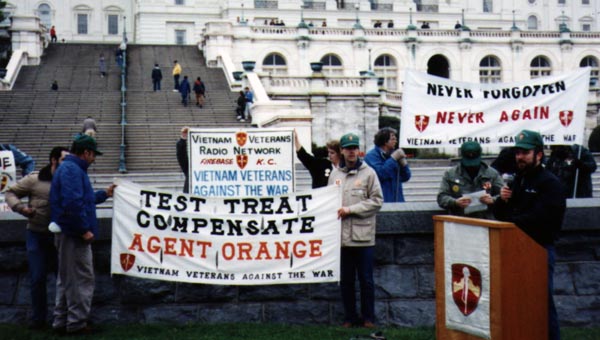 |
Operation Dewey Canyon III: 40 Years LaterBy Barry RomoA Limited Incursion Into The Country of Congress
It was late April, 1971, and in Southeast Asia the war still raged. In Washington, we lobbied Congress, got arrested when we held a sit-in on the steps of the Supreme Court, and challenged Nixon to bring as many Vietnam vets as we had brought to speak for his often cited "silent majority." On this final day we were taking a longer step as we shuffled forward, hurling curses along with the medals won in Vietnam, demanding an end to the war. Memories filled our minds as we moved slowly along — most of us quiet, lost in our visions... * * * * * Moving along the edge of the rice paddy, we circled the rising hill. We had taken seven casualties the day before from the local VC; today we were looking for them. We found rice caches, but the villages were empty — not even the old folks remained. Our company was spread out, moving in single file between the openness of the rice paddies and the beginning of the jungle. We moved quietly, not talking but looking, listening and waiting for something to happen. After several hours, it happened. The VC opened up on us from a hill. We hit back, not just with our rifles, machine-guns and grenade launchers, but with heavy gunship and artillery support. The VC kept on fighting, kept on shooting and we kept hitting back at them. Our fire wasn't concentrated; we were spread out around the hill. And then friendly fire started hitting our company and my platoon — fire coming over the hill, missing the VC and hitting us! The gunships were spraying the area as well, not just with M-60's but also 50's and rockets. I grabbed my RTO and ran to the squad that was hit — we went through enemy and friendly fire, popping smoke to stop the gunships. The whole squad was hit bad. Artillery had blown men as far as 50 feet; my platoon sergeant was dead, his body ripped apart. There were no smoke grenades left to mark the area for medevac choppers to land and take the wounded to a hospital. I ran into the paddy and had the choppers guide in on me. They landed quickly and got all the wounded out, even the body of my dead sergeant. While I was walking slowly back to the rest of the company, my CO said he was putting me in for a medal. I couldn't sleep that night. A medal for men's lives. The medic gave me some tranqs to sleep. * * * * * Standing in line, I remembered that day, again moving slowly in single file. The day in Nam several years earlier was more real than the present. As vets threw their medals away, we made statements — "These are for my brothers;" "If we have to fight again it will be to take these steps." All I could manage was, "These ain't shit" — nothing dramatic. The American Legion, when asked, commented on the demo saying, "We find it sad when any veteran throws medals away won in meritorious service." What the Legion spokesman didn't understand was that it wasn't the "merit" that made the medals of value — instead, it was the memories of friends bound up with those medals. As Vets Threw Their Medals on the Capitol Steps: — "I'm still on active duty, and I say get the hell out." — "Here's my merit badges for murder...from the country I betrayed by enlisting in the Army." — "I'd like to say just one thing for the people of Vietnam. I'm sorry. I hope that someday I can return to Vietnam and help rebuild that country we tore apart." — "I earned a Good Conduct medal in Vietnam. In the words of another son of Massachusetts, Henry Thoreau, my only regret is my good conduct." Reprinted from VVAW's 25th anniversary booklet produced in 1992.
|



